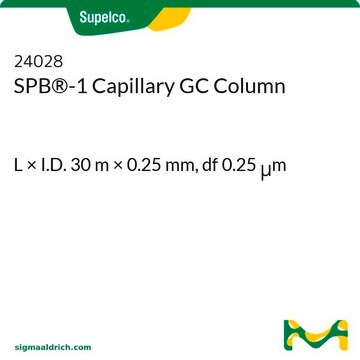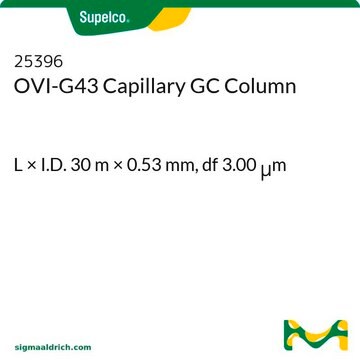25347
SPB®-5
L × I.D. 30 m × 0.53 mm, df 5.00 μm
Se connecterpour consulter vos tarifs contractuels et ceux de votre entreprise/organisme
About This Item
Code UNSPSC :
41115710
eCl@ss :
32119290
Produits recommandés
Matériaux
fused silica
Agence
meets requirements for USP G27 and G36
Paramètres
-60-260 °C temperature (isothermal)
-60-280 °C temperature (programmed)
Valeur bêta
27
df
5.00 μm
Technique(s)
gas chromatography (GC): suitable
L × D.I.
30 m × 0.53 mm
Groupe de la matrice active
Bonded; poly(5% diphenyl/95% dimethyl siloxane) phase
Type de colonne
capillary non-polar
Vous recherchez des produits similaires ? Visite Guide de comparaison des produits
Description générale
Capillary GC column is also known as open tubular column. The carrier gas flows through the central aperture and is unrestricted throughout the length of the column.
Application: This non-polar general purpose column provides primarily a boiling point elution order with a slight increase in selectivity, especially for aromatic compounds.
USP Code: This column meets USP G27 and G36 requirements.
Phase:
USP Code: This column meets USP G27 and G36 requirements.
Phase:
- Bonded
- Poly(5% diphenyl/95% dimethyl siloxane)
- ≤0.32 mm I.D., <2 μm: -60 °C to 320 °C (isothermal or programmed)
- ≤0.32 mm I.D., ≥2 μm: -60 °C to 300 °C (isothermal or programmed)
- ≥0.53 mm I.D., <2 μm: -60 °C to 300 °C (isothermal) or 320 °C (programmed)
- ≥0.53 mm I.D., ≥2 μm: -60 °C to 260 °C (isothermal) or 280 °C (programmed)
Application
SPB®-5 Capillary GC Column was used for speciation of the nitrogen compounds (quantitatively), which are polar and somewhat basic in nature, with chemiluminescence detection. It may be used as stationary phase for determination of nivalenol and deoxynivalenol in cereals by electron-capture gas chromatography. It may also find application in being used as stationary phase in capillary column gas chromatography for determination of sterols.
Autres remarques
We offer a variety of chromatography accessories including analytical syringes
Informations légales
SPB is a registered trademark of Merck KGaA, Darmstadt, Germany
Choose from one of the most recent versions:
Déjà en possession de ce produit ?
Retrouvez la documentation relative aux produits que vous avez récemment achetés dans la Bibliothèque de documents.
Determination of nivalenol and deoxynivalenol in cereals by electron-capture gas chromatography.
Scott PM
Journal - Association of Official Analytical Chemists, 69 (5), 889-893 (1985)
P M Scott et al.
Journal - Association of Official Analytical Chemists, 69(5), 889-893 (1986-09-01)
Nivalenol (NIV) is an important Fusarium mycotoxin shown to occur naturally in grains from several countries. Extraction and cleanup procedures previously described for trichothecene analysis have been modified to give good recoveries of NIV from cereal products. The extraction solvent
Determination of sterols by capillary column gas chromatography. Differentiation among different types of olive oil: virgin, refined, and solvent-extracted.
Jimenez O and Gonzalez ADV.
Journal of the American Oil Chemists' Society, 73 (12), 1685-1689 (1996)
J Corwin et al.
Cancer, 43(3), 1007-1013 (1979-03-01)
Solitary plasmacytoma of bone (SPB) and extramedullary plasmacytoma (EMPC) are unusual solitary tumors of plasma cell origin. The clinical differences between these tumors and multiple myeloma are the subject of continued study. This review examines the radiotherapy experience at M.
J M Jurado et al.
Talanta, 106, 14-19 (2013-04-20)
4-Methylsterols and 4,4-dimethylsterols of 47 samples of subcutaneous fat from Iberian pigs reared on two different fattening systems, "Extensive" and "Intensive", have been analyzed by GC-MS and GC-FID. The lipids were extracted by melting the subcutaneous fat in a microwave
Notre équipe de scientifiques dispose d'une expérience dans tous les secteurs de la recherche, notamment en sciences de la vie, science des matériaux, synthèse chimique, chromatographie, analyse et dans de nombreux autres domaines..
Contacter notre Service technique



